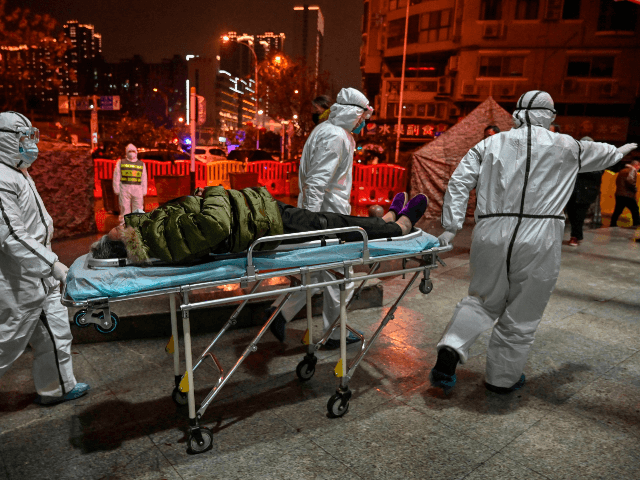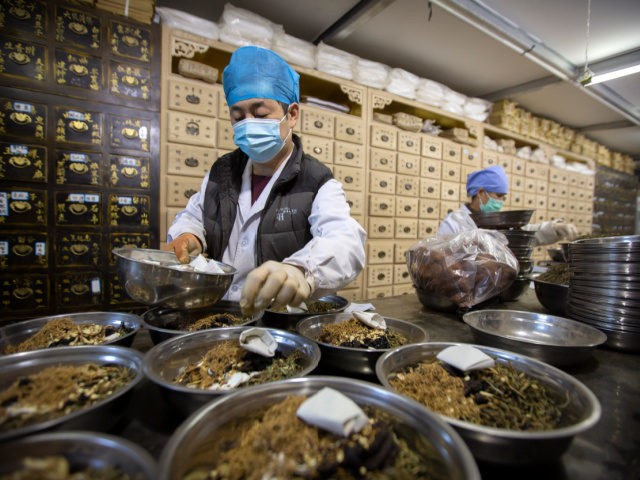Hong Kong’s government announced Thursday it had asked China’s ruling Communist Party to send “experts” in “Traditional Chinese Medicine” (TCM) to Hong Kong in an effort to help treat certain symptoms of the Chinese coronavirus in elderly Hong Kong patients, Radio Television Hong Kong (RTHK) reported.
Hong Kong CEO Carrie Lam told reporters at a press conference on March 24 she “had asked the central government [of China] to send a delegation of Chinese medicine experts to Hong Kong” to help combat the city’s latest epidemic of the Chinese coronavirus.
“I strongly believe that another team of [traditional] Chinese medicine experts from the mainland will offer great support to our anti-epidemic work,” she stated.
Lam said Hong Kong health officials were recording “about 200 deaths per day” as part of the city’s latest Chinese coronavirus outbreak, adding the “hospitalisation rate among the elderly is still high.”

Medical staff wearing protective clothing to help stop the spread of a deadly virus which began in the city arrive with a patient at the Wuhan Red Cross Hospital in Wuhan (HECTOR RETAMAL/AFP via Getty Images).
Tony Ko, the chief executive of Hong Kong Hospital Authority, echoed Lam’s remarks Thursday. He told reporters on March 24 experience in China allegedly demonstrated “[traditional] Chinese medicine could effectively relieve symptoms such as coughing, constipation and fatigue in Covid [Chinese coronavirus] patients.”
China’s state-run Global Times quoted Ko on Thursday as saying TCM could “help the elderly with coughs, constipation, poor appetite, cold and fatigue.”
TCM is a wide-ranging practice dating back to 2,500 B.C. that aims to promote good health in an individual. Treatments of TCM may involve herbal supplements, specific movements, or acupuncture. China’s ruling Communist Party has successfully co-opted the ancient practice of TCM in recent years by promoting it as a state-sponsored cure-all. The Chinese government’s official backing of TCM has helped the methodology grow into a $50 billion industry. Beijing has most recently attempted to peddle TCM treatments to Chinese coronavirus patients, claiming TCM techniques such as acupuncture may help alleviate certain symptoms of the Chinese coronavirus.
The U.S. Centers for Disease Control and Prevention (CDC) does not list acupuncture or any other TCM techniques among its approved treatments for the Chinese coronavirus.
Hong Kong, a city of 7.5 million, has recorded about one million Chinese coronavirus cases since its most recent epidemic of the disease began in late December 2021. The city has documented approximately 4,600 deaths in connection with the outbreak over the past three months.
Hong Kong’s high death rate due to the Chinese coronavirus caused a shortage of coffins in the city last week. Agence France-Presse (AFP) quoted an unnamed Hong Kong funeral industry representative as saying just 300 coffins remained in Hong Kong on March 17. The person added that the city’s remaining coffin supply was “expected to be gone by the weekend.” Hong Kong leader Carrie Lam confirmed the coffin shortage in statements to local media on March 16. She said at the time her government was expecting Hong Kong to receive two shipments of coffins from China to restock the city’s supply.

COMMENTS
Please let us know if you're having issues with commenting.